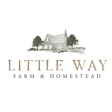
Mission Farming and Trusting in God's Providence with Divine Mercy Farm
On this episode Mathew had the opportunity to meet with Matt from Divine Mercy Farm - this is a really interesting interview as Divine Mercy Farm is a Mission Farm which operates as a nonprofit. They talk about how Divine Mercy Farms operates, discuss homesteading and much more. You might be interested in seeing the short film featuring Divine Mercy Farms on the Living Dine Mercy show on EWTN - you can find the link to that in the show notes.
Short Film featuring Divine Mercy Farm: Click Here
_____
Check out Fidei.Email and use code "LittleWay" for a discount. We recently switched our farm's email address to Fidei Email after learning it is owned and built by a Catholic. Fidei Email represents much of what we hope our partners represent - a commitment to the Catholic Faith including the way the business operates. We cannot recommend Fidei Email enough and we hope you choose to switch to Fidei Email from your current email provider.We recently switched our farm's email address to Fidei Email after learning it is owned and built by a Catholic. Fidei Email represents much of what we hope our partners represent - a commitment to the Catholic Faith including the way the business operates. We cannot recommend Fidei Email enough and we hope you choose to switch to Fidei Email from your current email provider.
Do you have a great homesteading story to share? Send us an email at hello@littlewayhomestead.com. Let us know!
We are also looking for contributors to our website blog. If you are interested in having a homesteading, small-scale farming, or Catholic faith themed post included in the blog - send us submissions directly at hello@littlewayhomestead.com
Are you a Catholic farming, homesteading or otherwise producing an agricultural good (e.g., beeswax candles, etc.)? Consider listing your business on the Little Way Farm and Homestead website. There is no charge at this time to do so. Visit www.littlewayhomestead.com/directory.
For more information about Little Way Farm and Homestead including the farm, podcast, and upcoming events, check out https://littlewayhomestead.com/.
For media inquiries, advertising, speaking requests, guest referrals, consulting and more - email us at hello@littlewayhomestead.com

